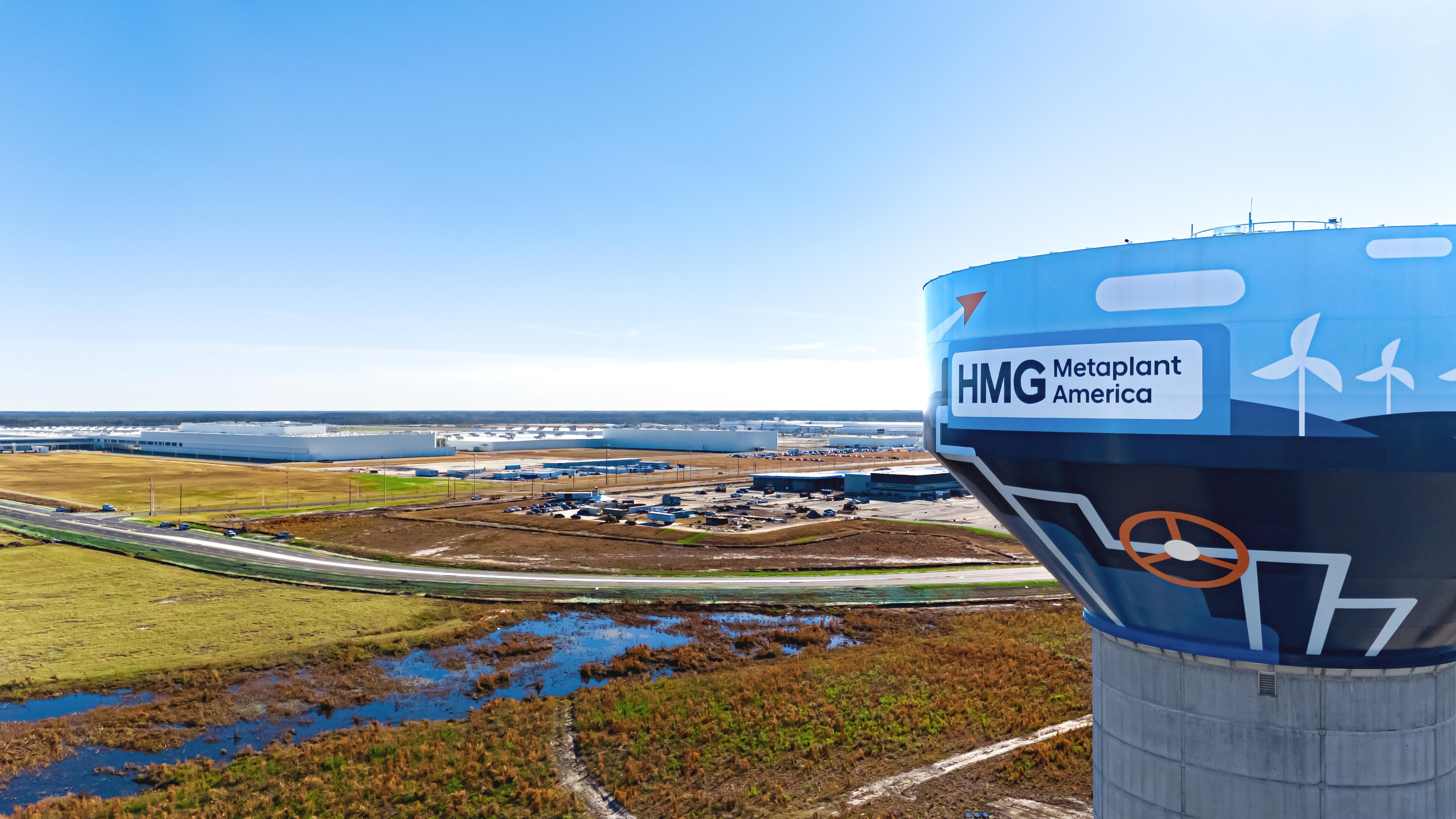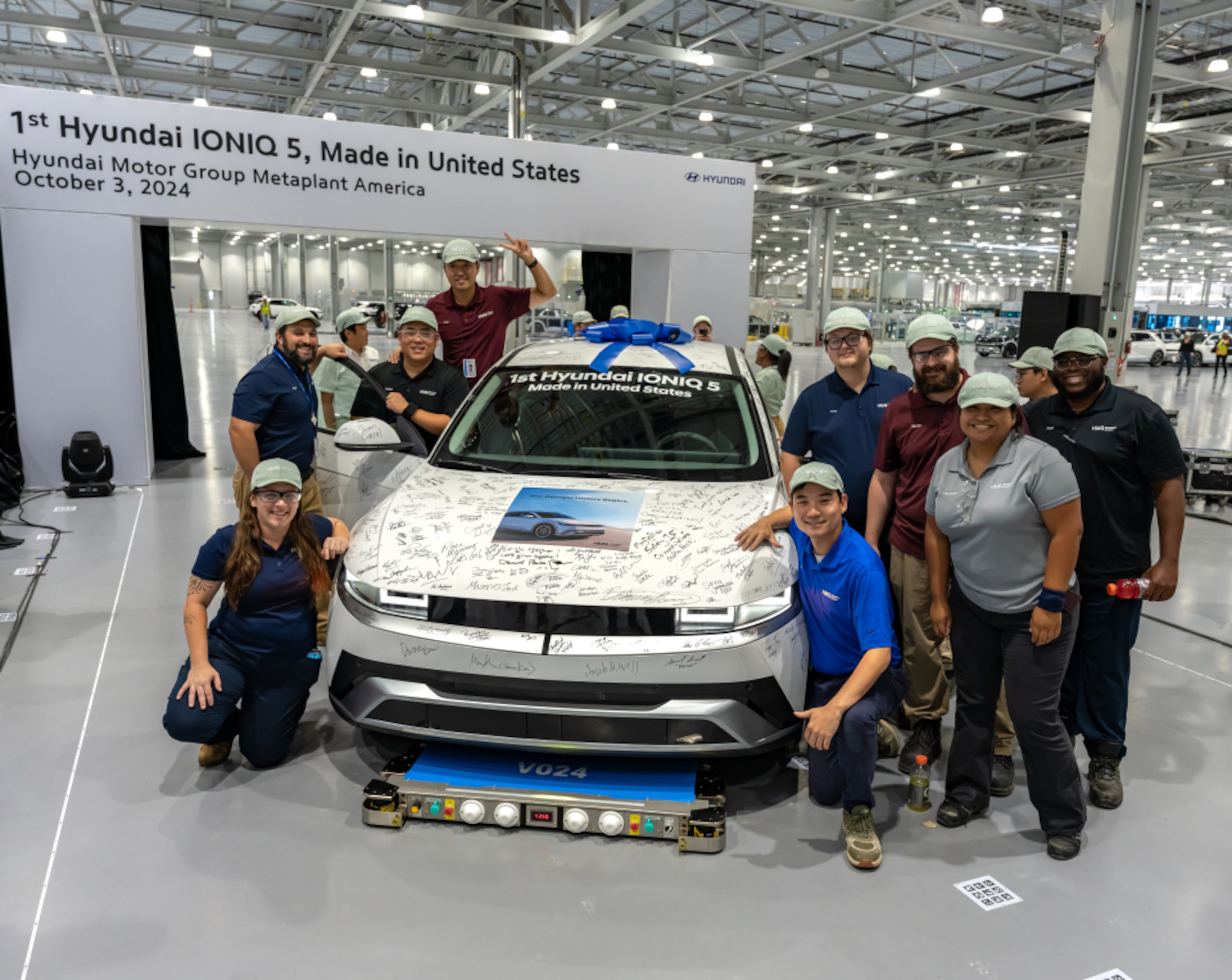10 hybrid and EV models, 3K jobs part of Hyundai’s next phase in Georgia

Hyundai Motor Co. on Thursday unveiled an ambitious growth plan to accelerate its electrified vehicle offerings in North America, a strategy that hinges on rapid expansion in Georgia.
The Korean automaker detailed a $2.7 billion expansion to its electric vehicle factory near Savannah, which only completed its first construction phase 11 months ago. Hyundai said it plans to hire 3,000 more workers in Georgia and increase production to 500,000 units annually at the 16 million-square-foot factory it calls the Metaplant by 2028.
Those 3,000 jobs are part of the 8,500 jobs Hyundai has previously said it will eventually employ at the campus along I-16 in Bryan County.
By the end of the decade, the company aims for 60% of all Hyundai vehicle sales to have electrified powertrains, which includes fully electric vehicles and hybrids. The Metaplant is slated to eventually assemble 10 different EV and hybrid models.
Thursday’s announcement comes on the heels of a Sept. 4 immigration raid at the campus’ battery factory, currently under construction, which triggered an international firestorm. Hyundai has said it remains committed to the project, though the raid has caused anger in Korea and will temporarily pause construction of the site amid discussions about visa issues.

But the announcement lays out the road map for the next phase of Georgia’s largest economic development project. It shows how the Peach State will play a pivotal role in the global automaker’s EV expansion, which executives emphasized is the company’s future.
“In an industry facing unprecedented transformation, Hyundai is uniquely positioned to win,” José Muñoz, president and CEO of Hyundai Motor, said in a news release. “ … We are delivering comprehensive electrified portfolios across all segments, localizing production in key markets and leveraging breakthrough technologies.”
The announcement comes hours before Hyundai holds its annual investor meeting in New York City, the first time it has been held outside Korea.
North America is a key market for Hyundai, and a substantial part of its growth plans on the continent center on its Savannah area factory.
In a statement congratulating Hyundai, Gov. Brian Kemp said the announcement “reinforces their commitment to this project and our state. We look forward to working with them on their continued growth and success for years to come.”
First announced in 2022, the Metaplant was initially proposed as a $5.5 billion project, and grew to $7.6 billion upon further investment promises by the automaker. Korean battery giant LG Energy Solution provided even more juice by announcing a joint battery plant with Hyundai on the Metaplant site, increasing expected investment to $12.6 billion.
“We learned early on when we started working on the site that there’s only one speed with Hyundai — fast,” Trip Tollison, the Savannah area’s top economic development official, told The Atlanta Journal-Constitution.
“‘Ppalli ppalli,’” he added, “which is Korean for ‘hurry, hurry.’”
Work so far
To recruit Hyundai to Georgia, state and local officials offered the automaker an incentive package worth about $2 billion.
Every six months, Hyundai has to submit a compliance report to the Georgia Department of Community Affairs to showcase investment and job creation updates. As of the end of June, Hyundai reported it hired 3,129 workers and invested $5.3 billion so far, according to reports obtained by the AJC.
Hyundai finished building the first phase of its EV factory in about two years. More than 20 suppliers have similarly announced projects around coastal Georgia and rushed to meet Hyundai’s pace.
The Metaplant site made international news — and was the center of a diplomatic emergency between the U.S. and South Korea — when Immigration and Customs Enforcement raided the battery factory construction site, halting work and detaining nearly 500 people. More than 300 were Korean nationals, primarily high-skilled workers in battery technology, which federal immigration agents said lacked proper visa documentation.
Washington and Seoul expedited the release of most of the detainees, allowing nearly all of the Korean nationals to fly back to their home country. President Donald Trump has indicated in social media posts that the visa process needs to be tweaked to prevent the raid from impacting foreign investment in U.S. manufacturing.
Still, the matter put into stark contrast two Trump administration goals: a crackdown of immigration and re-shoring of jobs from foreign companies that need to bring skilled professionals into the country to train new American workers.
Hyundai currently builds two EV models in Georgia — the IONIQ 5 crossover and IONIQ 9 three-row SUV.

The promise of building 10 electric and hybrid models at the Metaplant is a sign to Tollison that Hyundai is planting deep roots.
“They are investing and relying on us to deliver,” he said.
Amplifying electricity
Hyundai aims to sell more than 5.5 million vehicles globally by 2030, with roughly 3.3 million of those being EVs, hybrids or other electrified models.
That undertaking is a worldwide effort, and Thursday’s plan outlines next steps for Europe, Korea, India, Saudi Arabia, Vietnam and North Africa.
“Hyundai is uniquely positioned to win through our unmatched combination of compelling products, manufacturing flexibility, technology leadership, outstanding dealer partners and global scale,” Muñoz said.
But North America — and thus Georgia — remains a focal point.
Hyundai said by 2030 it aims to domestically produce more than 80% of its vehicles sold in the U.S. The company also wants to increase its domestic supply chain to 80% from 60% by the end of the decade.

To accomplish those goals, Hyundai announced last month it is making $26 billion of new investments in the U.S. between 2025 and 2028. Those include the Georgia Metaplant’s next phase and on-site battery plant, as well as a steel factory in Louisiana. Other projects and uses for those funds have not been announced.
Hyundai, which also owns the Kia and Genesis brands, announced electrification efforts related to those fleets as well.
Kia has a factory in West Point, which in 2023 underwent an expansion to incorporate EV production. Genesis will soon launch its own alternative powertrains across its lineup, Hyundai said.
For Hyundai, it aims to have more than 18 hybrid models by 2030. It also expects to expand into new market segments, including midsize pickup trucks through a partnership with General Motors and light commercial vehicles.

The company in 2027 also expects to launch its first extended range EV that can travel 600 miles on a single charge. Hyundai said it’s a model that addresses consumer range anxiety and lackluster American charging infrastructure.
In one more piece of Georgia-related strategy, Hyundai plans to expand its hydrogen-powered semitruck investments in North America. Called XCIENT, the big rigs have spent months ferrying supplies between Georgia’s ports and rapidly expanding Metaplant site.
Correction
This story has been updated to correct the spelling of Immigration and Customs Enforcement.


